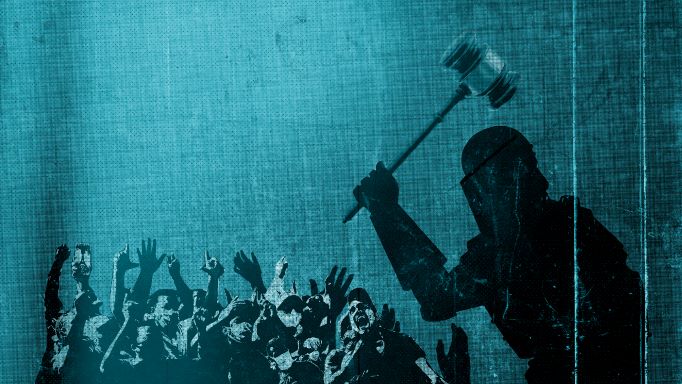At this point it is clear that Cuba has only regressed in terms of access to justice and criminal proceedings since 1959, as historian Dimas Castellanos demonstrated by comparing the sentences received by those involved in the insurrection known as La Chambelona in 1917, and Fidel Castro and the assaulters of the Moncada Barracks in 1953, with those that were handed down to dissidents and independent journalists imprisoned in 2003 during the Black Spring, and the Cubans who took to the streets between July 11 and 13, 2021.
In this regard, in 2021 the DIARIO DE CUBA showed that Fidel Castro would have been shot for the Moncada attack if he had been prosecuted according to the Procedural Law and Penal Code still in force then in Cuba.
Even more discouraging is the reality —known and confirmed in the accounts given to DIARIO DE CUBA by lawyers who worked in the defense of the 11J demonstrators— that, whenever it deems it fit, the regime violates its own laws, devised to suit its interests.
What can Cuban civil society do in the face of this dire panorama? Can it go beyond the condemnations and intellectual gymnastics that expose the regime's practices?
It would seem that the only option left would be an armed intervention by the United States, which some exiles are calling for; or an armed uprising by the people. Neither will happen, nor are they more advantageous for the Cubans than for the regime.
Democratic Senator Bob Menendez has already stated that the United States will not intervene on the island. As for the possibility of the people taking up arms, it has none.
Most importantly, either of these scenarios would embolden the regime to deploy repression even more brutal than the one exhibited during and after the 11J protests, shooting at civilians. It would also allow it to decree a state of emergency and thereby liquidate any vestige of freedom that Cubans still enjoy, which would be easy for it to do through the state’s control of the Internet, as was seen in July of last year.
Having ruled out the violent route, we must ask ourselves if, under the current circumstances, though adverse, there are elements that Cuban civil society can exploit to its advantage. The answer, without being overly optimistic, is ‘yes.’ In this third installment of the dossier on the legislative and judicial panorama in 2022, DIARIO DE CUBA addresses aspects of the reality of the island that can be used by civil society.
The regime, despite the fact that it manages to stay in power only through repression and the annihilation of all freedoms, yearns to be perceived as a democratic state that respects the rule of law, as evidenced by the Constitution approved in 2019, which stipulated what, for Cuba, are novelties, such as Habeas Corpus and the protection of constitutional rights.
Although the pro-government Union of Jurists of Cuba continues to show its unconditional support for the regime, many lawyers, academics and judges are beginning to question its work on behalf of repression and the false guarantees offered by the Constitution.
The recent support for Russia’s imperialist war —nuanced by its abstention at the United Nations— has exposed the regime’s double standards and could isolate it even more, in addition to the worsening of the economic crisis the country is enduring.
On July 11, 2021 Cubans who took to the streets, in addition to economic improvements, demanded freedom.
Although the sentences against the 11J demonstrators have been severe and unjust, the regime had to backpedal somewhat and eliminate, in many cases, the crime of sedition, which is of a political nature, such that it would mean recognizing what it insists on denying: the existence of political prisoners in Cuba.
With these sentences it is likely that the regime has succeeded in intimidating the people and dissuading them from future protests ? but only temporarily, unless it generates real changes. What there is no doubt about, however, is that it has garnered the hatred of a greater number of citizens.
The protests had already shown that the regime has lost the support of a major portion of the populace, which includes those who did not dare to leave their homes, but who also are no longer sympathetic to the government; and, particularly, young people. In a more passive way, this is demonstrated by the decreasing membership in the Young Communist League and the Communist Party of Cuba.
The fact that, at least under anonymity, lawyers who belong to the Bufetes Colectivos ? a requisite to practice in Cuba ? have criticized violations by judges and prosecutors in the cases against the demonstrators, shows a level of dissatisfaction among lawyers on the island that we may have never seen before.
Criticism of the regime by figures who had hitherto been politically silent, or sympathetic to the regime, makes it entirely conceivable that there is also discontent within the ranks of the Communist Party over the injustices perpetrated against the demonstrators and peaceful activists.
Against this backdrop, the approval of a new Penal Code that seeks to criminalize any form of dissent seems more likely to provoke a stampede of opponents, activists and independent journalists than to fill even more jails. This does not mean that the regime is not willing to imprison more Cubans, but doing so would entail adding more adversaries.
Cuban civil society certainly does not enjoy an ideal situation, because this does not exist in a dictatorial system. But it does have an alternative: to take advantage of the elements in its favor under these trying circumstances.
